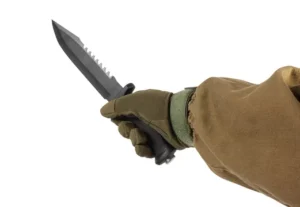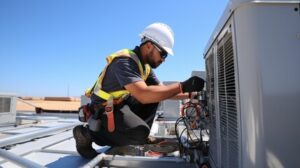A good pair of gloves is a must for hunting. Gloves protect against frostbite and hypothermia, minimize contact with ticks and chiggers and make it easier to handle decoys and guns.

It’s important to choose a glove or mitten that fits well. An ill-fitting pair will be uncomfortable and restrict movement. Contact Bugle For Elk for more information.
The type of insulation used in a hunting glove is crucial. You’ll need a material that is warm enough for your location and activity level. For example, a pair of gloves with a lower GSM rating will work best in warmer environments while a higher GSM will keep your hands warm when you’re active.
Another factor to consider is your hunting style. If you’re a waterfowler, for instance, you may need a breathable option that helps minimize contact with insects. If you drew a sheep tag, meanwhile, your gloves should be durable and combat cold temperatures and conditions.
A good example is the Cabela’s Gore-Tex Infinium Windstopper Glomitts. These half-finger gloves are designed for both bow and gun hunters, and they’re made with a Gore-Tex waterproof membrane to help keep your hands dry even when you’re in the rain or snow. They’re also insulated with a mix of 3M Thinsulate and Gore-Tex Windstopper to keep you warm and comfortable in harsh conditions.
In addition, the gloves are crafted with a wing thumb, gripper palm patch and a tacky silicone print for a secure grip on your weapon. A pre-curved finger construction helps the gloves form to your hand for a natural fit. And the gloves are touch screen enabled so you can use your smartphone or tablet while keeping your fingers warm and dry.
Whether you’re a waterfowler or a big game hunter, the kind of hunting gloves you need will depend on your personal tendencies and the environment you’ll be hunting in. A waterfowler might prefer a breathable option that’s lightweight and has built-in insect repellant, while a big game hunter may require a heavier pair of gloves or mittens with greater dexterity.
Other factors to consider include your skill level, the climate you’ll be in and the weapon you’ll be using. For instance, a bow hunter will want half-fingers for the index and thumb, while a gun hunter will need a full-finger design that offers more precision. Lastly, you’ll need to decide how much warmth you need, and this will influence your choice of material, GSM and other features.
Weather Resistance
A hunter’s hands are exposed to harsh environments that can wreak havoc on them if they aren’t properly protected. A quality pair of hunting gloves will protect the hand from abrasions and cuts while providing warmth, dexterity, and comfort. Choosing the right glove isn’t a simple matter of preference, however. Different hunters may need different features for a successful hunting experience.
Cold weather hunting requires gloves or mittens with insulated construction to trap your body heat and keep your hands warm. They must also be waterproof to prevent water, snow, and sleet from getting into your hands. This can make a difference in whether or not your hands stay dry, and it can even impact your hunting performance, especially if you’re shooting a firearm or handling a bow and arrow.
Typically, wool is the material of choice for insulating gloves and mittens. It’s highly breathable, which means your skin won’t get as cold as it would in a synthetic fabric. However, it isn’t necessarily the best option for very wet conditions, as wool will lose its insulative properties when wet. Fortunately, there are also gloves available made with other materials such as fleece and composite wool. These gloves are typically more affordable and can provide the warmth you need in wet conditions.
If you are a serious gun hunter who will be in the field in cold conditions, there’s no better choice than a pair of Drake MST Refuge Gore-Tex Double Duty Decoy Gloves. These gloves are designed with duck hunters in mind, and they’re a great choice for cold weather waterfowl hunting. They feature an outer layer of Refuge HS material for strength and durability, and they’re topped with a Gore-Tex membrane that repels water. Plus, they’re padded to help you stay comfortable in the cold.
For a more lightweight option that will still keep your hands warm and dry, consider the BlackOvis San Juan Fingerless Wool Gloves. These are a great mid-fall to early winter pair of gloves for hunters who need warmth without a lot of bulk. They’re crafted with high-grade textile that minimizes contact with ticks and chiggers, and they offer excellent breathability as well as effective dexterity.
Grip and Dexterity
As mentioned, it’s important that your hunting gloves offer a good grip so you can handle your firearm or bow with confidence and precision. Some gloves feature specialized trigger finger designs for improved sensitivity and control, so you can accurately pull the trigger and make the shot when it counts. Other gloves and mittens offer a variety of patterns and textures that improve grip even when the hands are wet, helping you keep hold of your gun or bow without slipping.
The time of year and the expected temperature also influences your glove choice. For example, early season temperatures can quickly swing from warm to cold, so a lightweight, breathable glove is best. For late season hunting, a warmer pair with more insulation may be needed.
Gloves and mittens are also designed to fit your hand size, with a snug fit to help lock in warmth and allow you to move freely while keeping your hands covered. Some models include a cuff that wraps around the wrist, preventing cold air from entering or exiting the glove. A snug fit also helps reduce movement and discomfort in the fingers, especially when handling your bow or firearm.
Other technical features that might appeal to you as a hunter include touchscreen-compatible gloves, so you can use your GPS or phone while wearing your gloves; an impact-absorption design that offers additional protection against abrasion and hard use; effective camouflage colors for stealth in the field; and a range of materials including Gore-Tex waterproofing for extreme weather resistance. With a wide selection of options to choose from, it’s easy to find the right pair of hunting gloves for your needs.
Fit and Comfort
When choosing hunting gloves, comfort is a top priority. Look for flexible, form-fitting gloves that are easy to maneuver and won’t rub or squeeze your hands. They should also fit snugly but not tightly; otherwise, they can be uncomfortable and will impede dexterity. Additionally, consider gloves that are water-resistant or waterproof to protect against wet weather conditions and keep your hands dry.
Heated hunting gloves are another great option for cold-weather conditions. These gloves come with a built-in heating system that warms your fingers to the perfect temperature for hunting. This can help increase your dexterity and accuracy, making it easier to grip a firearm or bow, while providing warmth and comfort that regular gloves can’t offer.
In addition to heated gloves, there are many other types of hunting gloves on the market. Some are made from specialized materials that prevent contact with ticks, chiggers, and other pests that could harm your skin. Others have an anti-odor property that helps to keep your hands fresh, while still delivering the same level of dexterity and performance.
Other options include leather gloves, which are sturdy and durable. They provide a premium feel and are available in a variety of camo patterns to match your hunting gear.
A good pair of gloves will provide a secure grip on your weapon and other equipment, as well as be comfortable to wear all day. You can find gloves that are padded and have extra warmth for cold weather hunting, as well as those with an ergonomic design for added comfort and dexterity.
One of the best hunting gloves is the Banded Squaw Creek Insulated Glove. It features SHEDS waterproof breathable technology, PrimaLoft silver premium insulation, and a durable 275 denier exterior construction to keep your hands warm, dry, and protected from harsh weather conditions. The insulated gloves have an adjustable cuff to ensure a secure fit and the Bottomland Camo pattern helps you blend in with your surroundings while stalking or hunting from your tree stand. The gloves are lightweight and feature a digitized goatskin leather palm for superior grip when handling firearms or other gear.
